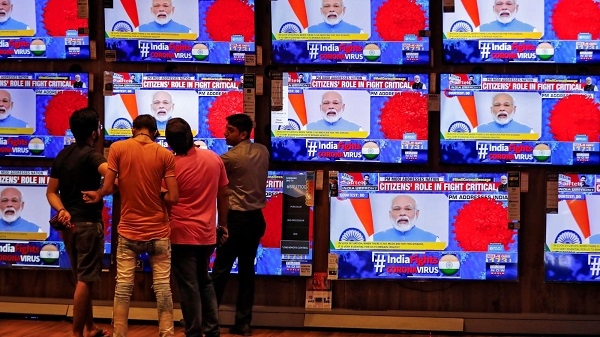Covid-19- Democracy needs a free press more than ever!
Total Views |
Facing a continuing upward trajectory in Covid-19 cases, the Indian government is clamping down on media coverage critical of its handling of the pandemic. More than 50 Indian journalists have been arrested or had police complaints registered against them, or been physically assaulted. The majority of those facing action are independent journalists working in rural India, home to more than 60 per cent of the 1.35 billion population. Isn't this anything but a clear, indirect message that the government cannot be shown in poor light? It does not matter if the news makers have to turn a blind eye to issues we witness? In first of such case, the Police had charged Om Sharma, a journalist with a Hindi daily in Himachal Pradesh, a mountain state in north India over a Facebook live report that showed stranded workers in need of food during the lockdown.
Sharma faced charges of spreading false information, disobeying the order of a public servant and acting negligently to spread infection of a dangerous disease. The world’s biggest population lockdown was partially lifted last week after 10 weeks that saw many of the country’s social and economic inequalities thrown into sharper focus, with the most vulnerable badly hit as their work vanished overnight. As of Thursday, 1.58 million people had had the virus and 38,000 had died.
Just hours before announcing the lockdown, Narendra Modi, the prime minister, held a video conference with 20 owners and editors from India’s largest print media organisations. “It was important to tackle the spread of pessimism, negativity and rumour,” he told them. Modi’s handling of the pandemic has been under increasing criticism as he has changed tack on policy and failed to curb the virus’s spread, with India now the third worst affected country after the US and Brazil.

In India, a country where half-truths circulate over social media in some cases spread by politicians and dubious remedies have been pushed, the government argued before the supreme court that fake news triggered the exodus of day labourers from the cities. The court directed the media to refer to and publish the official version about the developments. Journalists complain that their freedoms are being curtailed. Sharma was refused a curfew pass by his local administration. He had no option but to work from home, relying on social media platforms, asking local people to share their issues.
Earlier this month, the Committee to Protect Journalists wrote to the Himachal Pradesh government, resulting in the chief minister announcing that the cases against Sharma and five other journalists would be withdrawn. In Jammu and Kashmir, reporters have alleged physical assaults by police. On 11 April, police slapped and used batons on Mushtaq Ahmed Ganai, a Srinagar-based reporter with the Kashmir Observer, before he was arrested. Ganai was out reporting on the lockdown at the time.
In the freedom of its media India, like many countries, falls somewhere in between the US and China. India is not an authoritarian country, but it is increasingly a democracy with quasi-authoritarian characteristics. The prime minister hands down pronouncements from up high. No reporter dares to interrogate him the way their American counterparts grill President Donald Trump almost every day. If you point out weaknesses in India’s fight against the virus – for instance, relatively sparse testing – a social media lynch mob immediately descends upon you.
For those who believe the current situation demands more of the policeman’s stick, the reporter’s pen is part of the problem. They expect journalists to act as cheerleaders for the government, taking each claimed success in the fight against the virus at face value, posing no awkward questions, keeping public morale high by downplaying gloomy prognoses. In this view, the media’s role is not to question the government, but to work shoulder to shoulder with it at a time of crisis.
Imagine, for a moment, a raging pandemic in India without credible journalists to verify the facts. Rumours would become the only information available. Amidst the uncertainty, fears would grow. The panic in society that any government rightly fears, would be much worse without trusted facts to counter it. Everyone should wish India well in its war against coronavirus. But if the media is doing its job properly expect a diet of gloom and doom, not of sunny optimism and good cheer. Leave that to party spokespersons, or their equivalents masquerading as journalists.
(With inputs from The Guardian)
Counterpoint-

